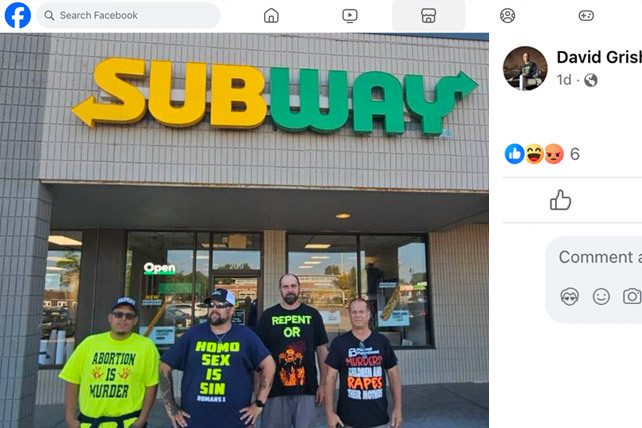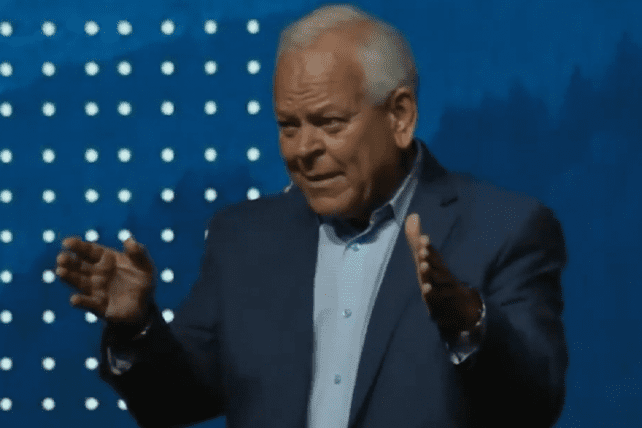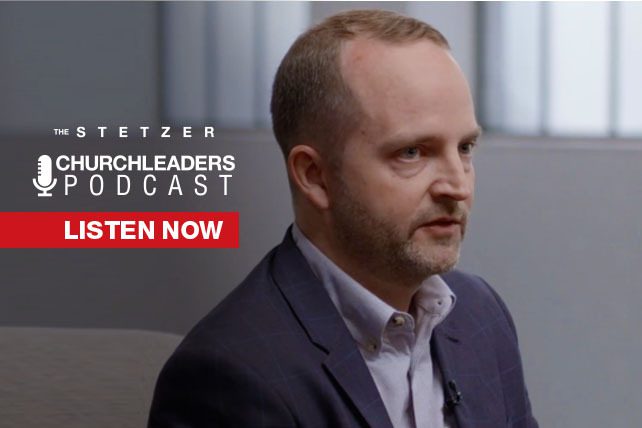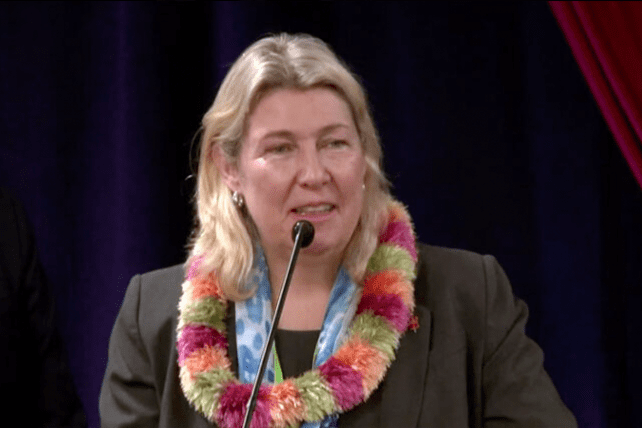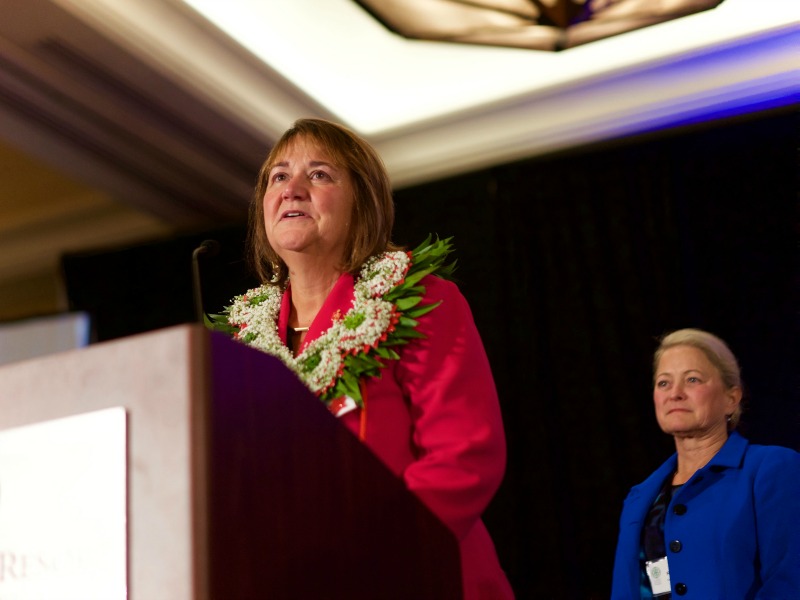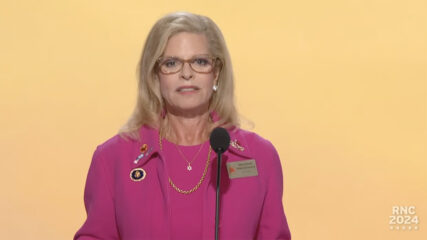Brad Hill on The Stetzer ChurchLeaders Podcast.mp3: this mp3 audio file was automatically transcribed by Sonix with the best speech-to-text algorithms. This transcript may contain errors.
Voice Over:
Welcome to the Stetzer Church Leaders Podcast, conversations with today’s top ministry leaders to help you lead better every day. And now, here are your hosts, Ed Stetzer and Daniel Yang.
Daniel Yang:
Welcome to the Sister Church Leaders Podcast, where we help Christian leaders navigate and lead through the cultural issues of our day. My name is Daniel Yang, national director of Churches of Welcome at World Relief. And today we’re talking to Brad Hill, Brad’s chief solutions officer at glue, a tech platform that provides churches with the tools and resources needed to build a more connected ministry. Brad joins us today to share how churches can embrace this new era of digital outreach so they can meet the needs of their communities. Now let’s go to Ed Stetzer, editor in chief of Outreach Magazine, in the dean of the Talbot School of Theology.
Ed Stetzer:
Well, and it’s good to have a conversation with Brad in just a moment. I know Brad for a few years and, you know, he works at glue. Some of you probably see me on the internet sometimes talking on the way in the interwebs, as the kids say. Uh, talking about some of the things that glue does. I function as a consultant with glue. And so I’m excited to kind of talk about some of the questions. I think glue is like this mystery to a lot of people. But also we’re going to talk about reaching people. So so again, let’s just stay with us because I think you’ll find this conversation really interesting. I want to start with a stat. So um, data from Barna showing. Well, Brad, you tell it to tell us about it. It’s, uh, the percentage of pastors who say their church is very effective at outreach to Non-churchgoers. What’s happened with that stat and why did it catch your attention?
Brad Hill:
Yeah, this is pretty pretty startling. Alarming, I might say. And Daniel, the state of pastor study that Barna recently put out, uh, they had previously asked pastors, does your church have an effective model or method for reaching people outside and back? In 2015, serving close to 1000 pastors, 13% said, yes, I have an effective strategy that that was kind of bad news enough. Fast forward to the recent update in the same study, similar methodology that 13% saying yes has now dropped to 1%. Uh, so, you know, we talk about the one, the 99, we’re we’re down basically nowhere to go but up territory for churches saying like, hey, we need to rethink the way that we’re reaching reaching folks outside. And so that’s I think that’s a great fodder for conversation. Yeah. And I think it’s.
Ed Stetzer:
Interesting to think that, um, you know, 2015 to 2023, there’s only an eight year difference. Of course, COVID’s in the middle of that 2023 would be after Covid. But um, and I think, you know, I think for I think a lot of people have kind of lost their, their confidence, maybe lost their focus, lost their way on this. Because if you went back to, you know, we’re old enough, maybe Daniel’s not, but we’re old enough to remember the seeker movement. And again, I had questions about it, critiques, that kind of stuff. But certainly people were working hard to say our church is effective at outreach to Non-churchgoers. The unchurched became a defining reality of planning. And but I think I think as those well, first of all, as the seeker movement sort of waned, I think in part because everyone who was going to be reached by a church like that was or most were, and culture shifted. I think people were like, well, what now? And they’re a little bit unsure. So I sort of feel the uncertainty with a lot of pastors. Any thoughts on what they were doing effectively, um, that they considered effective outreach. And now what people are thinking about what outreach might look like in the future.
Brad Hill:
I mean, I’m no sociologist, but I really think, you know, in the back of my mind is, is some other research you guys know well, which is the spiritually open generation. And I think you have to think through generational shifts here. We continue to see data that boomers are the ones that are most rapidly leaving church down at, like Gen Z, Gen Alpha. There’s openness, but that doesn’t necessarily mean that they’re coming to church. It just means that they’re spiritually open. And so I think understanding how to speak the language, you know, I mean, at your missiologist. So it’s like understanding the people we’re trying to reach. And I think for a lot of pastors, technology, phones, social media, Google still feels maybe like a how instead of a where. And you know, one of the things I see so plainly in the churches that are doing this well is they’ve really embraced the internet, social media as a valid playground for how do we reach people. And it’s a place it’s it’s a mission field very every bit as much as a physical one would be. And I think the churches that are embracing that mindset, um, are, are seeing success and are actually seeing traction. Um, but I think if you couple that pastor stat, we talked about the 13% down to the 1% with churches that might say, yeah, we feel like we have an effective digital strategy, not just broadcast, but we’re actually doing ministry online. I think there’s correlation there. And I think that’s that’s the place where that’s the opportunity for churches and pastors to grow is using technology, which is, you know, the natural native tongue of today’s generation.
Daniel Yang:
Yeah, we definitely want to push into that a little bit more. But before we do that, Brad, I’m curious from your perspective, do you do you feel like, uh, this is more of a strategy issue or is this more of a priority issue? Um, I know those that are jumping into digital ministry, uh, and not just streaming, but actually online engagement. You know, it’s a strategy. But if we back up a little bit more, are you sensing that this is actually much more than just a strategy issue?
Brad Hill:
Yeah, I, I think strategy is a good word, Daniel. I might also just say almost a mindset issue. Um, you know, my family just recently did a, um, a fun trip to Europe, first time a lot of us got to go to several countries, and we were in Athens, and, uh, I was we got to go stand on Mars Hill and do that whole all the touristy stuff there. But it was it was a good moment. I, I’ve always been fond of that passage where Paul is, you know, a student of the culture, right? And he talks about the unknown God and really learned this pagan culture and how how they thought. I think that mindset is one that we’re seeing laid bare right now with technology. And in my opinion, too few pastors really are, uh, seeking to understand those that we want to reach. Like, are you curious enough to understand the people that, um, are sort of outside the four walls? And what is it that you can learn about them and know about them? Uh, for example, one of the things we observe a lot with things flowing through glue here is just simple Google data.
Brad Hill:
What are people searching for on Google every single day? And if and that that data is publicly available, you know, we we look at it a lot. We aggregate it. And you’re going to see some pretty startling trends in most US cities about what’s really on the minds and the hearts of people. And yet when we go out on the street and ask people, do you know, do you think the church has answers for these issues? Normally people are like, think we’re crazy? They’re like, what do you mean? The church can help my relationships? What do you mean the church cares about me if if I’m dealing with anxiety. So there’s a disconnect there between, um, what we sort of believe in practice. And to your point, Daniel, even our strategy, uh, versus what’s on the hearts and minds of those we’re trying to reach. So I think, at minimum, a healthy dose of curiosity. And yes, we’re blessed these days that there is data and we can actually know more about our communities. And as one pastor said, we can exegete our communities and know exactly what’s on the minds of those we’re trying to reach.
Ed Stetzer:
Oh, you’re warm in my heart with those exegetes. I thought you’d like that. So, as one pastor once said, I like what one pastor is saying. That that’s a good sign. Um, so. But I guess let’s kind of walk through some of that stuff that you talked about because you, you know, you work at Glue Technology company. Um, and you started with what people Google and so, so what are people what are spiritually open people googling. And let’s just start there. Then I want to talk about, you know, other ways to respond to that. But I think that might even be news to some people because because I think I think what, uh, what a lot of pastors are sort of thinking is maybe they’re googling, where can I find a great church where I can get involved in a small group and tithe? But maybe that’s not what they’re googling that are open opportunities. What are they?
Brad Hill:
Yeah, we can we can dream that. Maybe we’ll get there. But now I will start on a good news point. We consistently see in most cities in the US, um, that among the top three things people are googling, uh, in the in the themes we care about, we’re dismissing things like politics and news, but, you know, issues of life. People are, um, quite hungry for prayer. And they have a just a general desire to connect. You know, it doesn’t mean connect with a church, but they they hunger for connection. I think that’s great news for pastors and leaders to know that once you get past those, however, then the list starts to become a little bit more sobering pretty fast. So what we see as top trends. Uh, loneliness. Anxiety is almost always in the top three. Currently it’s number one. As we’re recording this, I just check, um, and anxiety can be in a range of things, right? It could. It doesn’t always mean like clinical. It could just mean like, I’m wondering, do I have anxiety? Uh, we’ve actually seen success People actually want to take a quiz online to find out if they have anxiety.
Brad Hill:
Uh, toxic relationships, uh, grief. Um, there’s a there’s a long kind of diminishing list from there. The only exception to those trends I just said would be in, uh, in a time period where maybe there’s a geopolitical event. Um, it could be a storm, a natural disaster, a school shooting. Any time one of those types of issues flares up, you see a very strong and, uh, correlated pattern to changes on Google. And as pastors and leaders, we haven’t really had access in generations before to that sort of real time data. But, I mean, imagine as a pastor, if you knew literally last 30 days, what’s on the hearts and minds of people in my community, would that change the way you preach? Would it change the way you think about programs? And so we we hope that, you know, in the next generation, every church is using Google and whatever else comes next as a way to, you know, keep a finger on the pulse of what’s going on in our community.
Daniel Yang:
You know, earlier you made a slight distinction between technology as how and then, but also as a as a where. And I think that’s a really important distinction. I think a lot of times when people think about digital ministry, they’re thinking primarily broadcasting, um, and streaming. How might they think differently about digital ministry beyond just the streaming and the broadcasting?
Brad Hill:
Yeah, I think and that’s one of we have a short list of questions. We always like to sort of put in front of pastors to just get the frame of mind right. And that’s one of those is, um, has your team really thought through a strategy for digital ministry, not just digital broadcasting? So when we use the word ministry in that context, we are thinking about using every available digital tool available to reach someone, to engage with someone, communicate with them, you know, a little bit tongue in cheek. I’ll sometimes ask a pastor like, hey, if I pray for someone over text, does that count? And by the way, I strongly believe, yes. Um, you know, but that’s that that itself is an interesting question that challenges some mindsets. Um, can we do ministry without having in the flesh, face to face? Now, what we also know about Gen Z, Gen Alpha, anyone you know, born in recent decades. Um, for them, relationships are fluid. It’s not binary. Where, hey, I only have an on screen relationship with this person, or I’m only. I’m only in the flesh and the person incarnate with this person, it can flow back and forth. So for some churches and pastors, we see really effective strategy where we get introduced to someone digitally and we might communicate text chat for a while and then we meet for coffee. But then it goes back to texting, and it might be eight, ten, 25 steps before they’re ready to come visit us on Sunday morning. But that whole process of engaging and developing trust and relationship can very much happen online. And by the way, for those of us that are growing churches, we always think about scale. It’s incredible. You know how much you can get done online, digitally. And it’s also an answer to how do we how do we engage more people more effectively, more volunteers, all those things. So there’s tremendous possibility here. But for a lot of churches, I think it starts with, hey, are we going to get beyond just streaming and marketing and really use these digital channels as a way to actually minister to people.
Ed Stetzer:
Yeah. So you said there were a series of questions to ask. Just go go through those questions quickly as you’re asking pastors about their digital ministry.
Brad Hill:
Yeah, I think one is, is our church a place that someone would feel at home or welcome if they’re, quote, kind of turned off to church? Um, that’s that’s a big theme that we see a lot for folks online is they, they have experienced church in the past. They may have preconceived notions about church. Um, so creating creating an environment, creating an attitude in our people where we seek to, you know, serve and minister to the person before. We’re just trying to make it about us. Uh, another question would be, um, and this is this is honestly one of my favorite, more compelling ones. Would we be okay doing ministry, even ministering to a person digitally if that person never darken the door of our church? Because I think a lot of pastors believe digital ministry is an on ramp. And it you know, every funnel needs to end with them sitting in the pew Sunday. But the question is, would we would we be open to doing ministry if it meant they never come to our church? Uh, even if we maybe minister them into a different church or it takes two years. Um, and then that digital ministry question about digital ministry versus digital broadcast. Um, so there’s, there’s some mindset shifts in there, but that usually gets a lot of conversation going. Just those those three points. Yeah.
Ed Stetzer:
I think one of the things that’s worth noting too is, you know, because I’ve, you know, been working with glue now for, I don’t know, a couple of years and kind of seeing under the hood. And I know one of the things that we’ve done is referred to about, well, almost 300 to 400,000 people to churches to receive help. And and the help is not I mean, we say help today we might think of food pantries. Not generally that. But I remember you got to go back a little bit back in the day. We did this, we started this church and I wanted to reach a lot of seekers. And so we sent out this this we started our church with this marriage series. And it was a church. This was in the 90s. So it’s a church. The town didn’t have a contemporary church. We were pretty I don’t know, I don’t know how edgy we were, but maybe for then. And so we basically said, we’re going to launch this series, and we were trying to have over 200 people at our first service. You have to be a certain age to remember when churches did these things. We did mailers. And people still do mailers work differently today, but still work, that kind of stuff anyway. So what surprised me was because everyone kept I kept going to these conferences and people said we had 200 people at our first service, and then we dropped down to about 100 and we were off to the races. Well, so we had 234 people show up at our first service, which was great, but they overwhelmingly came because of our mailers. And our mailers basically told them, we’re going to do a marriage series, they’re going to help save your marriage. The sets are Church leaders.
Ed Stetzer:
Podcast is part of the Church Leaders Podcast Network, which is dedicated to resourcing church leaders in order to help them face the complexities of ministry. Today, the Church Leaders Podcast Network supports pastors and ministry leaders by challenging assumptions, by providing insights and offering practical advice and solutions and steps that will help church leaders navigate the variety of cultures and contexts that we’re serving in. Learn more at Church leaders.com/podcast network. So we ended up with about 200 people who were in marital crisis because, I mean, if you’re sitting at home and you’re so like, right, well, man, if my marriage is in such a rough spot that if I got a mailer from a church I didn’t know at a place I’d never been to, I’d go to that to save my marriage. So what happened is all of a sudden we had, like, I mean, our church became a marriage counseling place, like, all of a sudden, because I was our mailers, our everything else. So I think that, um, I’d gone to the church planning conferences and what I was thinking was going to happen was because I was young and naive, was that 200 plus people were going to show up. They were all going to receive Jesus, and many of them did. We baptized two thirds of the adult attendees at our church and within a year. But what happened was a lot of people with a lot of issues needed a lot of ministry. And I think that’s a lot like what we experienced through these references where, where you know with and give me the number how many, how many glue, how many have we have we sent to churches thus far? And am I accurately portraying what the kind of ministry we’re doing is?
Brad Hill:
Yeah. You are, I mean, yeah, as we sit here today, it’s about 380,000 connections that have been made. That means someone started on Google or they started at a, uh, Christian concert, or they heard it on Christian radio and they reached out for a connection, glues a switchboard in this sense. So we made a connection of that person to one church that’s happened 380,000 times. And you’re right, a lot of times the thing that they’re most hungry for is help in an area of their life. Um, and everything you just illustrated, I think is a great it can initially feel like a point of concern for a pastor like man, Uh, these feel like a lot of again, I’ll use my one pastor reference. One pastor said it feels like a lot of messy people out there, which I, I a little bit, um, sort of smile at because, like, yeah, I’m a mess. I think a lot of us, we all have life coming at us, but, um, there may be an oversampling, let’s just say, of folks who have, as you said, need counseling, need help. Um, what we see, too, is this is an opportunity for us to decide, uh, do we really want to tackle head on the the issues and the, the life that people are dealing with? And is that does that responsibility rest on our church’s shoulders alone? How might we, for example, bring in other ministries or other community partners we have who are narrowly expert at one area of life that I’m not as a pastor or leader, but not give up the opportunity to share the gospel, to build trust, to build relationship.
Brad Hill:
So what’s happening here digitally, in a sense, is also a little bit of a what we call a glue. A collective might opportunity where, you know, if we can marshal, if I’m a normal church of 190 or 100 people, I probably don’t have all the fancy programs and resources to deal with mental health and marriage and all those things uniquely well, but there are ministries who can. And we we try to like forge partnerships where that pastor, that leader has the primacy of relationship and then can reach out for help. Mental health’s a great example of that. So in those 380,000 connections we’ve made, you do get people who very legitimately need counseling or need even, you know, some psychiatric help. So we partner with key ministries in this process who can can be inserted in the process or can be kind of like first responder, if you will, and get that person to a loving, trusting, but biblical place of stability so that a church can then really carry that relationship long term, that’s proven to be a very effective strategy, better than what else they would get on Google, by the way, where they’re going to get referred outside of this to secular psychology resources, Doctor Phil, secular self-help apps, whatever else is out there, we really, you know, our call is the church should put itself in the pathway.
Ed Stetzer:
Yeah. And I think that’s I mean, I’m for that what you’re describing. We want to we’re for all kinds of mental health resources that would help people at their point of need. But having that supportive church community, I think makes makes all the difference.
Daniel Yang:
Brett, I want to come back to something because, I mean, I think we all believe in personal interactions. I mean, that that is, uh, sort of an ultimate goal in some ways. Um, but, you know, you mentioned something earlier that people are increasingly looking first for that digital connection first. And so, you know, for pastors and church leaders listening to this, and they’re thinking about like developing their digital strategy. And why do you why do you think the shift towards digital first interactions is happening? Like, what are some of the reasons driving the people feeling nervous about, like not doing an in-person first and they want to check out the digital, whether it’s a podcast, whether it’s downloading a sermon or even having an email relationship with somebody from the church.
Brad Hill:
Well, I think, you know, you have to look really at our culture and where we are as a society. I mean, stepping into a strange church you’ve never visited with a bunch of people you don’t know. That’s a big step. Um, and it’s not it’s not dissimilar to many other areas in our lives where we’re researching a product to buy a vacation, to go on whatever I think most of us and, you know, we’ve we’ve tracked with a lot of great research on this point. We trust now our own research and our own experiences online more than we would trust what a marketing message would say on a commercial. Um, certainly we’re going to do our homework before we step into anything that feels like commitment. Um, so you kind of set that that point at one side of this, the other. We’ve spent a lot of time out literally on the street doing videos, doing a lot of just guerrilla research with people. And when we say, like, hey, if you had a challenge in your life, if you had a spiritual question or if something went on in your marriage or relationships, where would you turn for help? And I would tell you this, don’t quote me statistically here. Editor. Um, no.
Ed Stetzer:
No, not me.
Brad Hill:
But but I would just tell you. I’ll just say vast, vast majority. Like, it feels like nine out of ten. Maybe it’s less than that. But vast majority of people, when we say, where would you turn for help? Number one answer Google. Um, they don’t turn to their pastor. They don’t turn. Some people said their mom. But I mean, searching online is by far everyone’s first reach when they they have a question, they need help. And they’re going to trust those five star reviews before they trust what the marketer said. So we need to understand that as churches that we are in the field of play right alongside every other commercial consumer, uh, marketplace offering that’s out there, and all of the folks who are trying to reach are trained to search to trust those reviews. I mean, heck, people, you know, I’ve got two teenagers. They they would trust what a TikTok video tells them is real, uh, like it or not. So we’re we’re in that that’s the mission field that we’re operating in in 2024. Yeah.
Ed Stetzer:
They would trust their, uh, their, their research on YouTube more than maybe an expert in the field. I mean, it is the reality. But that does I mean, so the assumption that the front door to your church is the front door is that that people will literally go in, which I think was a big part of the assumption of the entire seeker movement, was that, you know, make it the front door welcoming, and people will come in and experience that. I mean, the front door now certainly is the online engagement. And and I don’t think a lot of churches have fully caught up to that. And that’s multifaceted. So certainly you should have your someone to see what your service looks like online, someone to see what your building looks like online, someone to see the you know what? What will you know here. Plan your first visit. Here’s what it’s going to be like. Certainly. But I think where a lot of it lags is using that evangelistic connection. That’s one of the reasons I connected with glue is I think a lot of it lags in that space because because, you know, as people are less likely to come to a church as their first front door experience, then what is it? As you said, it might be a Google search. Then we can respond to that Google search and more. So it gets a little it gets a little trickier. All right. When in the data research analysis I’ll let you answer it anecdotally or with data. What’s the top reason why people want to connect with the church. What are you seeing in the research or top reasons if that’s helpful?
Brad Hill:
Uh, in a word, it’s community. I mean, you said it a moment ago, and this, I think, is both, um, a little bit of a blind spot, but a giant opportunity we have right now in the, in the local church is to I don’t want to say reposition, but I think it’s it’s maybe we’ve buried some of the lead in that. The church is such a rich, deep place of community and relationship, even, by the way, a number of secular sociologists, journalists, researchers we’ve been tracking published articles everywhere from New York Times, Washington Post, uh, CNN and the like who are saying things right now in articles like we have searched high and low, uh, for anywhere in, in culture. And we cannot find a place better than the local church that provides the type of wraparound support and community that folks most hunger for. And so when we think, you know your question, like, what’s the number one thing that causes people to come or engage in church? Uh, we even saw this during Covid and you did some great work on, you know, church trends through the pandemic. The churches that seem to have the highest degree of stickiness and retention tended to be, on balance, the ones who had really emphasized community relationship in a legitimate way.
Brad Hill:
Not just like, oh, we’re going to put you in a room in a Sunday school class, but we really see our church as a place to foster community and relationship. That has to be a set of values that we live out and don’t just give lip service to. But, you know, imagine if we could position our churches as, uh, not come to church, but come to community, come, come to find your tribe, find people to belong to. And as I said a moment ago, even in our Google tracking studies, we see always a desire to connect as one of those top three themes that leads people through. So as a pastor, as a leader, that’s the good news you need to know is people are hungry for connection. And we’ve likely got, uh, you know, the product for them, if you will. And I hate to put it in such commercial terms, but we have an answer to one of the greatest needs in society. And of course, we all know that that’s all infused with the power, life saving power of the gospel. But for the world outside, it might just be like, we’ve got community here, like the one you’ve been searching for and haven’t found.
Daniel Yang:
Brad, if I’m leading a church that, um, you know, we’ve got YouTube and we’ve got a Facebook. Um, and, uh, we have social media presence, but really need to go to that next level in terms of our digital ministry presence and digital ministry like engagement. Um, and again, not a large staff, you know, maybe 2 or 3, you know, pastors on staff with some administrative help. What would your advice be to the church leadership in order to increase their digital ministry?
Brad Hill:
Well, I think 2 or 3 things, Daniel, you know, what we just talked about to me is a is an important mindset or strategy, which is, you know, thinking about how we’re fostering relationship. We have a saying a glue relationship catalyzes growth. So which surprises some people because they’re like, I thought you were a tech company. And we are. But what we’ve what we clearly know and understand is technology programs, content should always be in support of the relationship, should never seek to replace it or be a shortcut around it. So the more you see your church as as a place to foster community and relationship, that’s step one, I think. Step two, um, we see on a very practical level the way you communicate in your church. Um, there’s simple technology answers today that can dramatically improve and increase the way you engage with people. I’ll give you a real simple one. A lot of us still send weekly emails around in our church. You know, those Thursday announcements or the Monday bulletin? Whatever. Um, if you do any degree of tracking, what you’ll find is on a on the best of days, maybe 40% of people read that email. The vast majority of your church does not. On the flip side, texting just making that simple switch from email to texting will typically double or more your engagement with people. Um, and the great thing about texting is it’s it’s kind of weird to say, but it feels more intimate than email. It’s something more personal. It’s also, incidentally, a great way if your church is one that’s trying to cultivate a culture of inviting, where you’re trying to get people to invite their neighbors, invite their coworkers, their fellow students, texting is a great way to maybe set up a seven day, 30 day series or devotional to that end.
Brad Hill:
Um, last thing, I’ll just share a point of data with you guys. We were talking about Google a minute ago and the searching, um, patterns that we see. We. This will have to be anecdotal again, but, um, we’ve seen pretty strong evidence to suggest that when we find people searching online for things like loss, depression, anxiety that I listed a moment ago, as many as 30 to 40% of the people who are reaching out to Google for help are already in a church. In other words, the way I the way I interpret that is a lot of people feel more comfortable reaching Google for help than reaching their pastor, even if they’re already churched. And what that tells me is that we have an equal opportunity inside our four walls to think about reaching people and making them feel comfortable, making them aware. It’s I think a lot of repetition is good here, that, hey, if you have something going on in your life or if you just need to reach out for connection, we want to prioritize that here in our church. If that’s you, or if that’s someone you know and you know, we we’ve set up all these methods for you to communicate with us, whatever is most comfortable for you, but for people to understand that their church is a safe place, I think is is great work for us to do because otherwise, as I said, we’re seeing literally people go out of the building to get help when we really would desperately want them to, to get that help inside.
Daniel Yang:
We’ve been talking to Brad Hill. You can learn more about glue and take advantage of a variety of ministry resources at gluas. Thanks again for listening to the Setzer Church Leaders podcast. You can find more interviews, as well as other great content for ministry leaders at church Leaders compered cast. And again, if you found our conversation today helpful, I’d love for you to take a few moments. Leave us a review that will help other ministry leaders find us and benefit from our content. Thanks for listening. We’ll see you in the next episode.
Voice Over:
You’ve been listening to the Stetzer Church Leaders podcast for more great interviews as well as articles, videos, and free resources, visit our website at Church leaders.com. Thanks for listening.
Sonix has many features that you’d love including powerful integrations and APIs, secure transcription and file storage, collaboration tools, transcribe multiple languages, and easily transcribe your Zoom meetings. Try Sonix for free today.

